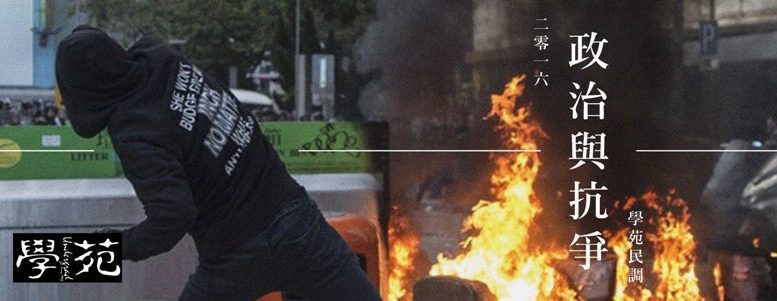By Chan King-cheung –
With pro-independence groups planning to drum up support for their cause in schools, the Education Bureau has acted to meet with education bodies recently for them to take preventive measures to stop the spread of separatist thinking. The Hong Kong School Managers Society has issued a statement, warning of damages to the society if pro-independence thinking spreads to campuses. Following moves to prevent pro-independence activists from entering the Legislative Council, the education sector will emerge as the next battle-field of the war against pro-independence campaign. It is worrying that pro-independence thinking has spread within the young generation.
School is a place for the transfer of knowledge and the stimulation of thinking among students. Theoretically, the freer the learning environment the better. But anti-independence work has now become a political task. Given the fact we do not have national education and history education that could enhance a sense of national cohesiveness among students, it will be difficult for schools to fight against the spread of independence thinking in campuses. Worse, front-line teachers do not have a lot of experience in handling the issue in campus. They may be caught in the middle, being criticised for whatever they do or do not do. The education sector will be in a state of tension. If the Government mishandles the matter, it risks provoking strong reaction from teachers and triggering a bigger political row.
During the colonial era, the British Hong Kong government had also prohibited the promotion of “patriotic education” in schools. It was proved to be easier said than done. Many students organisations held patriotic activities outside schools and had succeeded in luring a lot of students to participate. A faction that oriented towards the Chinese nation (國粹派) had emerged during that period. They were those who were pro-Beijing and had recognised in broad term the communist authorities on the mainland. During the 1960s and 1970s, the pro-China faction had managed to attract a sizeable group of followers. Their leaders took key positions in students unions in major universities and the Hong Kong Federation of Students.
About the same time, there was another group of advocates (社會派) who felt adamant they should be oriented towards the Hong Kong society. In terms of strategy, they were active in organising social campaigns for policy changes. Advocates of the two lines of thinking had often clashed in election for office bearers in student unions and student publication bodies.
Fierce debates between the two factions were regular features in university campuses. None of them had become the mainstream. The authorities were not able to stop the spread of the trend of patriotism in schools. But at the same time, the advocacy of patriotic thinking could not change the minds of all students. Under a free environment, new lines of thinking had risen one after another. They counter-balanced other ideas.
A more effective way to “counter” a school of idea is always to ease and reduce it, not to adopt heavy-handed tactic to suppress it. To ease and reduce it, the first thing needed to be done is to find out the root cause of the thinking and give dosage accordingly. So far, there is no convincing explanation about the proliferation of pro-independence thinking among the young generation. The theory first floated was that youngsters were dissatisfied with the status quo. They felt there was a lack of upward mobility, difficulty in advancing further in their career and buying their own flats. They had therefore developed a mentality of anti-social, anti-establishment. But such mentality had already emerged in the immediate years after the handover. Why it has only evolved into pro-independence thinking now?
Another line of thinking is that separatist thinking emerged because of the political reform fiasco, which resulted in a further delay of universal suffrage. As young people felt they were not able to master their own destiny, they found no choice but to wage political struggle. But fighting for democracy and fighting for independence are not the same. The question of why pro-independence thinking has arisen in the past two years is still a mystery. The battle against pro-independence thinking will be futile if the mystery remains unanswered.
Chan King-cheung is a veteran journalist. He writes on political and economic issues in Hong Kong and China. This article was translated from his regular column in the Chinese-language Ming Pao.
Photo: Picture taken from HKU Student Union’s Undergrad Facebook


Be the first to comment on "Rise of pro-independence thinking among youth still a mystery"